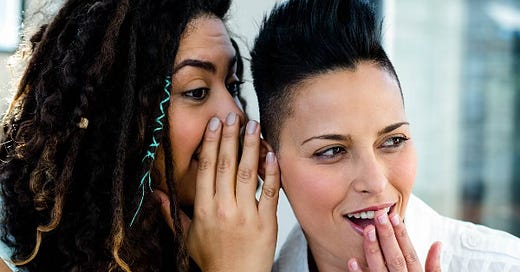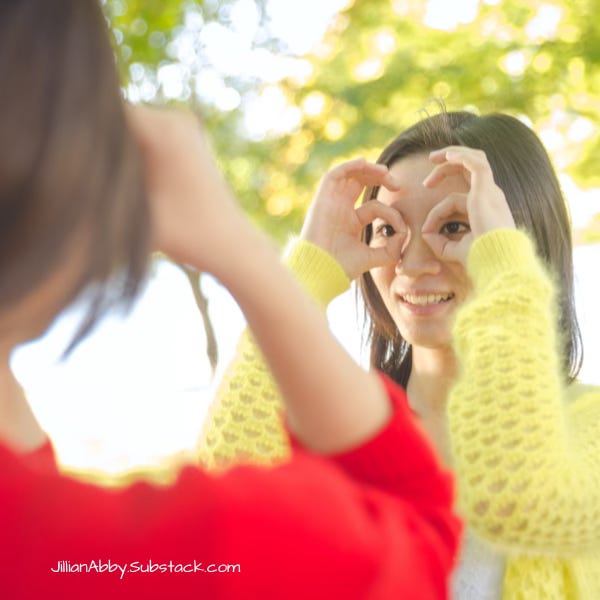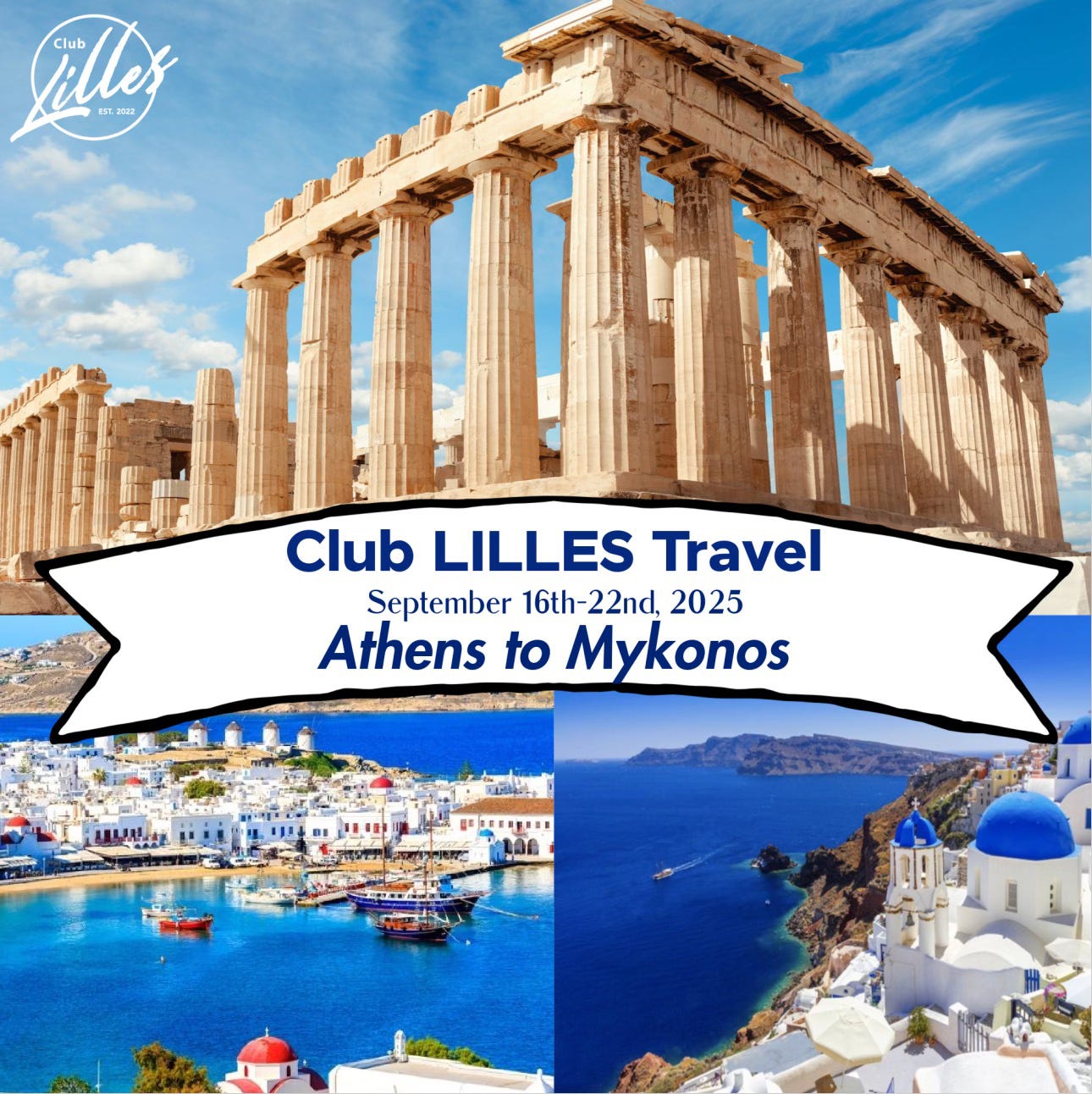A Baby Gay's Guide to Lesbians
Sashaying amongst the sapphics in a culturally informed way.
Dear Queer Abby,
I'm a later-in-life lesbian (have come out in my mid-40s) and I'm also a college educator. My appearance (hair, clothes, etc) has changed such that I now look pretty visibly gay.
I've quickly come to realize that attraction to women and even lesbian relationships does not clue one in to the facets and nuances of lesbian culture. Broadly speaking, I'm curious what advice you might give to those of us who are older "baby gays" in terms of being out in the world as a lesbian.
More specifically, I would love to know the playbook for what to do when you see other obviously queer women out and about--on the street, at a restaurant, at work, or if they're your students or subordinates in some way. Do you give them the nod? Do you totally ignore the fact that the two of you are the obviously queer people in the room? I would love to feel less awkward about this!
Sincerely,
Signaling in San Diego
Dear friend,
So much to dive into here and I’m excited about it! Let’s start with the last part of your question—what do we do when we notice another member of the LGBTQ+ community in the wild?
As I like to do with nearly everything in my life, from deciding how to respond in a difficult situation, to deciding what my next book will be, to deciding if I really want to try a deadly spicy Paqui chip, I ask myself “Why?” It’s important to understand our motivation for why we do what we do and will help us come to terms better with whatever the outcome is.
I had a conversation recently with a dear friend who is both a member of the BIPOC community and LGBTQ+ community. We were speaking specifically about the need for Black organizations in schools and workplaces and I asked him to give me (a white lady) some perspective as to what these organizations meant to him.
He described it like walking through life carrying this heavy invisible backpack of expectations. Being in the company of another Black person, for him, felt like he could finally take that weigh off. He could show up as himself without judgment, bias, or fear.
I understood.
There is a feeling of safety when we find members of our own community. We can lay down that invisible backpack that has us wondering in the general population, “Is it okay for me to be here?” That’s not to say that BIPOC or queer folks don’t have judgments within our communities. It’s just that you are more likely to be judged for the superficial (like your choice in clothing), than who you fundamentally are as a human being (unless you’re a TERF).
Sending Sapphic Signals
So when we see a fellow sapphic out frolicking freely in the world, should we give them the code signal? You know, something very subtle like yelling, “Hey gay!” across a restaurant? I decided to consult with my wife, Jen, on this one as she is what I lovingly refer to as a “vintage gay.” She’s been in relationships with women since her teen years and provides a beautiful contrast to my own experience as a later-in-lifer.
She assured me that there is no right or wrong way to signal. (I assured her that I could probably brainstorm 276 “wrong” ways.) Anywho, generally it’s just an eye-contact thing, which may include a slight smile or nod. It’s a “Hey, I see you and I’m glad you’re here too” acknowledgment. Anything more than that, like screaming “I SEE GAYS!” or waving frantically like Forrest Gump waiting for Lieutenant Dan, is too much. But you knew that already.
What if they ignore you?
There are many ways your fellow sapphic family may respond—including avoiding eye contact and ignoring you completely. Jen and I were recently shopping at a clothing store. The only other people in the store were another queer couple. We attempted the eye contact and they seemed to avoid us completely… even when we were circling each other like sharks around the Under Armour section.
That’s completely okay. There are so many reasons why members of the LGBTQ+ may or may not want to signal or signal back (remember: we all have a different ‘why’ for doing things). Perhaps they have strong social anxiety. Perhaps they feel unsafe or strange to acknowledge us in that specific environment. Perhaps there are trust issues in their relationship, so making any sort of positive eye contact and connection with another lesbian would only further exacerbate the issue. Perhaps they are cave dwellers who only emerged to buy more sweatpants before retreating to their den for another year. Who the heck knows!
Regardless, it doesn’t mean we have to stop making human connection with others from our community. Every time we do, we offer the other person to take off their backpack of invisible expectations. We remind them that they are not alone and that they’ve got someone else in their corner. That’s a valuable and worthwhile thing!
What if they don’t ignore you?
Let’s flip this scenario on its positive little head. What if you signal and they respond back, maybe with a question or a compliment even? If your ‘why’ is to make more connection in the community and possibly even find friends, that is a very real potential benefit of signaling. This is also a great time to mention that you are allowed to talk like any other humans would…just make it as genuine as possible. Do you love their choice of shoes? Great! Tell them! Are you curious what breed of dog they have? Fabulous! Ask away!
Where making conversation can start to go awry (like with any human of any identity) is when it’s forced and fake. So, if you don’t have anything genuine to say, stick with non-verbal cues. But if you can come up with a genuine curiosity or something kind to say to them, go for it!
More often than not, if done with the right intention, people are open to receiving kind words from others. This is not only a question of sapphic culture and what is “okay”, it’s about human connection and learning how we can connect with each other in positive ways.
But Let’s Talk About Sapphic Culture
I am so glad that you pulled lesbian culture into your question. I’ve noticed that there is sometimes a (sad) divide between those who have been out for many years or their whole lives and those who are in the “later-in-life” or “baby gay” club. I’ve seen frustration from the elder gays who feel unacknowledged for the work they’ve done over decades to fight for the rights, freedom, and visibility of the LGBTQ+ community today. Even between my wife and I, she will say that I am “more out” than she is due to the circumstances in our lives and the timing in our society.
As a 38 year old, I didn’t have to worry about my parents potentially kicking me out of the house. I didn’t have to navigate the challenges of teenage dating, while also not being able to share the joys and struggles of teenage dating due to the risk of people’s judgments. As an adult with internet, it was far easier for me to locate things like 1) information on sexual health for same-sex relationships 2) community non-profits to support me in my physical and mental health and 3) organizations to connect with other people like me in social ways. It is absolutely a privilege that my wife didn’t have for many years.
At the same time, I seem elder members of the LGBTQ+ excited for the new wave of sapphic sisters to carry the torch and lighten the workload. Our hard-fought rights and rights that we need to continue to fight for. Want to show up positively for your community? See how you can use your talents to get involved.
One great way is through helping with Lesbian Visibility Week (LVW) activities. My recommendation would be to join Franco Stevens’ Curve Community on Facebook. Not only will you be able to connect with some really incredible members of our community, but you’ll get updates on when planning for the US/Canada LVW begins.
What Else Can a Baby Gay Do?
When it comes to joining any new group, I always recommend doing your research and coming in with an open mind of curiosity, rather than a closed mind of expectation or certainty. For me, that meant reading books, watching documentaries, and studying the history of the sapphic community.
The strength, courage, and ingenuity of how sapphic women have survived across the centuries is both heartbreaking and inspiring. Learning their stories motivates me to want to show up in a way that acknowledges and honors them. It also makes me realize how far we have come. As with any place where you’re new, come with respect. Ask before you tell. And listen to what others have to say.
Lastly, a portion of us in the later-to-lesbian community have internalized homophobia that played a role in our delayed self-acceptance. Acknowledging and working through that will allow you to show up better for the community at large.
You’re Doing It Right
I’d like to wrap this up by saying that you’re doing a great job! The fact that you care and you want to show up in the best way possible is so very good. Acknowledging that the lesbian community (and many sub-groups within the community) have their own culture, beliefs, expectations, and ideas is important.
Study up, connect with others, and in time you will feel more at home in this space. We’re all so happy you’re here!










Remember that scene in "Fast Times At Ridgemont High" where Phoebe Cates points out how there are three girls at the school that have styled themselves after Pat Benatar--and none of them talk to each other? That's the trans community in a nutshell. Every now and again, I will spot another trans woman out in the wild, but even for a trans person, it is considered a huge social faux pas to acknowledge a stranger's gender transition in any way. I understand why this is, of course--and yes, a big part of it is simple garden-variety politeness--but it also only adds to those occasional feelings of isolation with a dash of hormonal imbalance I sometimes experience.